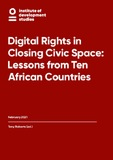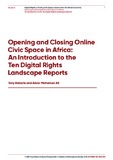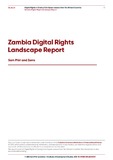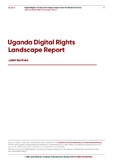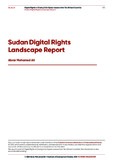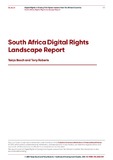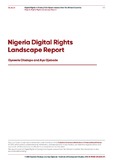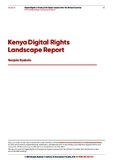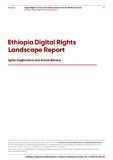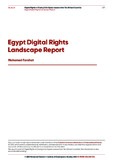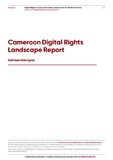Digital Rights in Closing Civic Space: Lessons from Ten African Countries
| dc.contributor.author | Roberts, Tony | |
| dc.contributor.author | Mohamed Ali, Abrar | |
| dc.contributor.author | Karekwaivanane, George | |
| dc.contributor.author | Msonza, Natasha | |
| dc.contributor.author | Phiri, Sam | |
| dc.contributor.author | Zorro | |
| dc.contributor.author | Nanfuka, Juliet | |
| dc.contributor.author | Bosch, Tanja | |
| dc.contributor.author | Oladapo, Oyewole | |
| dc.contributor.author | Ojebode, Ayo | |
| dc.contributor.author | Nyabola, Nanjala | |
| dc.contributor.author | Gagliardone, Iginio | |
| dc.contributor.author | Brhane, Atnafu | |
| dc.contributor.author | Farahat, Mohamed | |
| dc.contributor.author | Ndongmo, Kathleen | |
| dc.coverage.spatial | Zimbabwe | en |
| dc.coverage.spatial | Zambia | en |
| dc.coverage.spatial | Uganda | en |
| dc.coverage.spatial | Sudan | en |
| dc.coverage.spatial | South Africa | en |
| dc.coverage.spatial | Nigeria | en |
| dc.coverage.spatial | Kenya | en |
| dc.coverage.spatial | Ethiopia | en |
| dc.coverage.spatial | Egypt | en |
| dc.coverage.spatial | Cameroon | en |
| dc.date.accessioned | 2021-02-22T17:10:54Z | |
| dc.date.available | 2021-02-22T17:10:54Z | |
| dc.date.issued | 2021-02-26 | |
| dc.identifier.citation | Roberts, T. (ed.) (2021) Digital Rights in Closing Civic Space: Lessons from Ten African Countries, Brighton: Institute of Development Studies, DOI: 10.19088/IDS.2021.003 | en |
| dc.identifier.citation | ||
| dc.identifier.citation | Roberts, T. and Mohamed Ali, A. (2021) ‘Opening and Closing Online Civic Space in Africa: An Introduction to the Ten Digital Rights Landscape Reports’, in T. Roberts (ed.), Digital Rights in Closing Civic Space: Lessons from Ten African Countries, Brighton: Institute of Development Studies, DOI: 10.19088/IDS.2021.005 | |
| dc.identifier.citation | ||
| dc.identifier.citation | Karekwaivanane, G. and Msonza, N. (2021) ‘Zimbabwe Digital Rights Landscape Report’, in T. Roberts (ed.), Digital Rights in Closing Civic Space: Lessons from Ten African Countries, Brighton: Institute of Development Studies, DOI: 10.19088/IDS.2021.006 | |
| dc.identifier.citation | ||
| dc.identifier.citation | Phiri, S. and Zorro (2021) ‘Zambia Digital Rights Landscape Report’, in T. Roberts (ed.), Digital Rights in Closing Civic Space: Lessons from Ten African Countries, Brighton: Institute of Development Studies, DOI: 10.19088/IDS.2021.007 | |
| dc.identifier.citation | ||
| dc.identifier.citation | Nanfuka, J. (2021) ‘Uganda Digital Rights Landscape Report’, in T. Roberts (ed.), Digital Rights in Closing Civic Space: Lessons from Ten African Countries, Brighton: Institute of Development Studies, DOI: 10.19088/IDS.2021.008 | |
| dc.identifier.citation | ||
| dc.identifier.citation | Mohamed Ali, A. (2021) ‘Sudan Digital Rights Landscape Report’, in T. Roberts (ed.), Digital Rights in Closing Civic Space: Lessons from Ten African Countries, Brighton: Institute of Development Studies, DOI: 10.19088/IDS.2021.009 | |
| dc.identifier.citation | ||
| dc.identifier.citation | Bosch, T. and Roberts, T. (2021) ‘South Africa Digital Rights Landscape Report’, in T. Roberts (ed.), Digital Rights in Closing Civic Space: Lessons from Ten African Countries, Brighton: Institute of Development Studies, DOI: 10.19088/IDS.2021.010 | |
| dc.identifier.citation | ||
| dc.identifier.citation | Oladapo, O. and Ojebode, A. (2021) ‘Nigeria Digital Rights Landscape Report’, in T. Roberts (ed.), Digital Rights in Closing Civic Space: Lessons from Ten African Countries, Brighton: Institute of Development Studies, DOI: 10.19088/IDS.2021.011 | |
| dc.identifier.citation | ||
| dc.identifier.citation | Nyabola, N. (2021) ‘Kenya Digital Rights Landscape Report’, in T. Roberts (ed.), Digital Rights in Closing Civic Space: Lessons from Ten African Countries, Brighton: Institute of Development Studies, DOI: 10.19088/IDS.2021.012 | |
| dc.identifier.citation | ||
| dc.identifier.citation | Gagliardone, I. and Brhane, A. (2021) ‘Ethiopia Digital Rights Landscape Report’, in T. Roberts (ed.), Digital Rights in Closing Civic Space: Lessons from Ten African Countries, Brighton: Institute of Development Studies, DOI: 10.19088/IDS.2021.013 | |
| dc.identifier.citation | ||
| dc.identifier.citation | Farahat, M. (2021) ‘Egypt Digital Rights Landscape Report’, in T. Roberts (ed.), Digital Rights in Closing Civic Space: Lessons from Ten African Countries, Brighton: Institute of Development Studies, DOI: 10.19088/IDS.2021.014 | |
| dc.identifier.citation | ||
| dc.identifier.citation | Ndongmo, K. (2021) ‘Cameroon Digital Rights Landscape Report’, in T. Roberts (ed.), Digital Rights in Closing Civic Space: Lessons from Ten African Countries, Brighton: Institute of Development Studies, DOI: 10.19088/IDS.2021.015 | |
| dc.identifier.uri | https://opendocs.ids.ac.uk/opendocs/handle/20.500.12413/15964 | |
| dc.description.abstract | This report introduces findings from ten digital rights landscape country reports on Zimbabwe, Zambia, Uganda, Sudan, South Africa, Nigeria, Kenya, Ethiopia, Egypt, and Cameroon. They analyse how the openings and closings of online civic space affect citizens’ digital rights. They show that: (1) when civic space closes offline citizens often respond by opening civic space online; (2) when civic space opens online governments often take measures to close online space; and (3) the resulting reduction in digital rights makes it impossible to achieve the kind of inclusive governance defined in the Sustainable Development Goals (SDGs). We know far more about openings and closings of online civic space in the global North than we do in the global South. What little we do know about Africa is mainly about a single country, a single event, or single technology. For the first time, these reports make possible a comparative analysis of openings and closings of online civic space in Africa. They document 65 examples of the use of digital technologies to open online civic space and 115 examples of techniques used to close online civic space. The five tactics used most often to close online civic space in Africa are digital surveillance, disinformation, internet shutdowns, legislation, and arrests for online speech. The reports show clearly that any comprehensive analysis of digital rights requires consideration of the wider political, civic space, and technological contexts. We argue that countering the threats to democracy and digital rights discussed in the reports requires new evidence, awareness, and capacity. We propose applied research to build capacity in each country to effectively monitor, analyse, and counter the insidious impact of surveillance and disinformation; and a programme to raise awareness and mobilise opinion to open civic space and improve citizens’ ability to exercise, defend, and expand their digital rights. | en |
| dc.description.sponsorship | UK Research and Innovation (UKRI) Global Challenges Research Fund (GCRF) | en |
| dc.language.iso | en | en |
| dc.publisher | Institute of Development Studies | en |
| dc.rights | This is an Open Access paper distributed under the terms of the Creative Commons Attribution 4.0 International licence (CC BY), which permits unrestricted use, distribution, and reproduction in any medium, provided the original authors and source are credited and any modifications or adaptations are indicated. | en |
| dc.rights.uri | http://creativecommons.org/licenses/by/4.0/ | en |
| dc.subject | Rights | en |
| dc.subject | Technology | en |
| dc.title | Digital Rights in Closing Civic Space: Lessons from Ten African Countries | en |
| dc.rights.holder | © Authors © Institute of Development Studies 2021 | en |
| dc.identifier.team | Digital | en |
| dc.identifier.doi | 10.19088/IDS.2021.003 | |
| rioxxterms.funder | Default funder | en |
| rioxxterms.identifier.project | Default project | en |
| rioxxterms.version | VoR | en |
| rioxxterms.versionofrecord | 10.19088/IDS.2021.003 | en |
| rioxxterms.funder.project | 9ce4e4dc-26e9-4d78-96e9-15e4dcac0642 | en |
Files in this item
This item appears in the following Collection(s)
-
IDS Research [1671]
Except where otherwise noted, this item's license is described as This is an Open Access paper distributed under the terms of the Creative Commons Attribution
4.0 International licence (CC BY), which permits unrestricted use, distribution, and reproduction in
any medium, provided the original authors and source are credited and any modifications or adaptations are
indicated.

